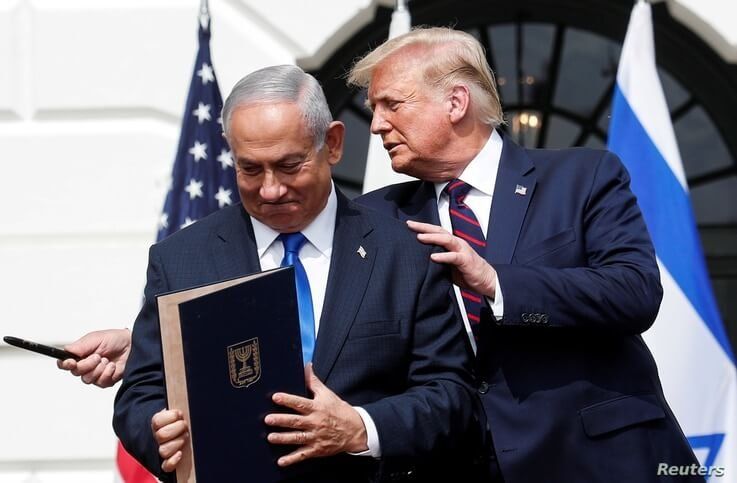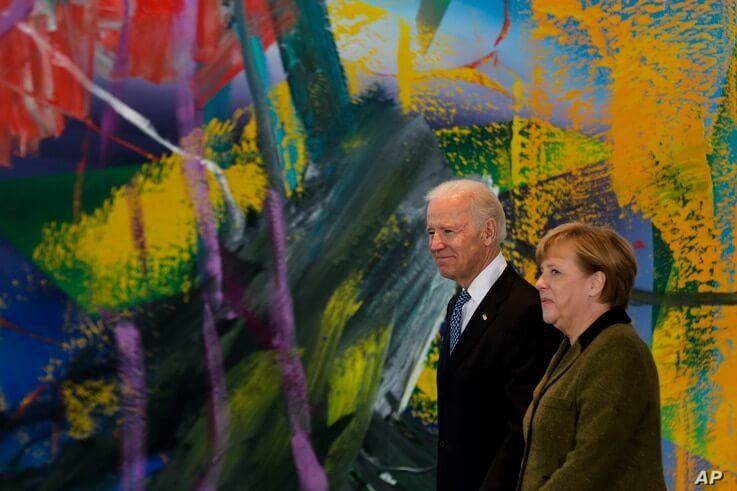
World Leaders Anxiously Watch Race for White House
Governments across the world are anxiously watching the race for the White House, as they prepare for either Republican Donald Trump securing a second term as U.S. president or for an electoral win by his Democratic challenger, former Vice President Joe Biden.
Who will be the international winners and losers from Tuesday's U.S. election?
"The last four years have confirmed that the choices the U.S. makes are highly consequential for international politics," according to a commentary by Britain's leading foreign policy research group, Chatham House.
Chatham House added, "The next president will determine how America's diplomatic, economic and military resources are invested, and, especially, what value the U.S. will attach to existing alliances and multilateral institutions. Whoever sits in the White House will shape the trajectory of the U.S.–China relationship and the global economy, with significant implications for America's partners."
And implications for U.S. adversaries. Although some profess to claim the impact might not be as great as some might think.
In Russia
Russian experts say they expect little improvement in relations between Moscow and Washington, regardless of who wins.
"Putin and people around him might like Trump because he fits very nicely with their view of the world," according to Andrey Kortunov of the Russian International Affairs Council, a research group based in Moscow, in referencing Russian President Vladimir Putin. Kortunov points to Trump's skepticism about the importance of multilateral institutions and his more transactional approach to diplomacy.

But Kortunov says he does not expect Moscow to shift its foreign policy in the coming months, regardless of who is in the White House. Antagonism, he says, will continue.
"Russia's leaders have long been convinced that any unilateral steps or shifts in Moscow's foreign policy will be perceived in the West as a sign of weakness, and thus an invitation to crank up the pressure on Russia," he said. "Russians don't back down. This principle has remained at the core of Russia's foreign policy throughout the years."
Former Russian officials over the past few months have also told VOA they expect relations to remain antagonistic with the United States and Europe, blaming what they see as a U.S.-led conspiracy to curb Russian influence.
"Some people in the Kremlin hoped it would be different with Donald Trump. But I wasn't holding my breath," a former senior Kremlin aide told VOA, describing debates among Russian officials in the run-up to the 2016 U.S. election. Much of the same is happening now, say other former officials.
Global interest
Despite apparent Russian nonchalance about the result, few in Moscow or elsewhere in the world doubt the enormous global ramifications of Tuesday's election. A reporter for Britain's Sky News suggested on air that the world should have a vote in the election because of the international repercussions of the result. This is not just a national election, but a global one, he said.
Hundreds of millions around the globe will likely stay up for overnight election watch parties. Others say they will interrupt their work day to keep an eye on the results as they start to unfold. Some cities are planning to broadcast election coverage on billboard-sized televisions.
Aside from the fascination with U.S. politics, foreign governments often view the election through the prism of their strategic interests.
"Although the U.S. presidency is not as all powerful as many people think, it is certainly, both inside and outside of the U.S., the most powerful elected position in the world. Right now, the world is looking at the U.S. with great anxiety and expectation," according to Cas Mudde, professor of international affairs at the University of Georgia, writing in Britain's The Guardian newspaper.
Leaders guarded
Anxiety is shared by governments at this stage — whether they prefer Trump or Biden. With opinion polls getting their predictions wrong in 2016, no overseas leader can be sure how this election will turn out.

Most foreign leaders have been guarded in expressing who they would prefer to see win. Analysts say national leaders most closely associated with Trump, such as Israeli Prime Minister Benjamin Netanyahu and Indian counterpart Narendra Modi, have been cautious in their praise of him, fearing if he loses, their full-throated support of Trump would adversely affect relations with a potential Biden administration.
Hungary's firebrand populist Prime Minister Viktor Orban has been one of the few European leaders to speak out in support of Trump as he was in 2016, announcing in an article in a Hungarian newspaper in September that he's "rooting for another victory for Donald Trump because we are very familiar with the foreign policy of U.S. Democratic administrations, built as it is on moral imperialism. We have tasted it — albeit under duress. We didn't like it and we don't want a second helping."
Other conservative nationalist leaders in central Europe have been quieter, despite sharing Trump's antipathy toward the European Union and his populist ideology. Poland's President Andrzej Duda and senior officials of the country's Law and Justice Party, or PiS, have avoided replying when asked who they prefer.
Throughout his term in office, Trump has polled badly in Europe generally, but more so in the west of the continent. Only 13% percent of Germans, 18% of Swedes, and 20% of the French have confidence in him to do the right thing in world affairs, according to a survey at the start of the year by the Pew Research Center. Those percentages are much lower than for Trump's predecessor, Barack Obama, during his last year in office.
Public opinion becomes a little more mixed moving west to east, largely due to approval of Trump by supporters of populist nationalist parties, which are stronger in central Europe and who see the Republican president as an ideological ally, especially when it comes to migration. The Pew poll found a majority of Poles, 51%, had confidence in Trump doing the right thing in world affairs.
In Western Europe
The western European public and governments, by contrast, are eager for a reset from the Trump years, and a return to more predictable and traditional transatlantic relations, analysts say.
"Biden has always been a staunch trans-atlanticist — and, over the course of his decades-long political career, he has forged close relationships with key European leaders, including German Chancellor Angela Merkel," noted Alex Soros in commentary for the European Council on Foreign Relations, an international research institution partly funded by his father, philanthropist George Soros.

Western European officials say they expect relations would go smoother and more predictably with Biden than with Trump. Biden is a known quantity, having served 34 years in the U.S. Senate and eight as Obama's vice president. They say they expect him to work as he always has, building up alliances and working on the international front as a multilateralist. His foreign policy would highlight common liberal values with western Europeans, they say. But they do not expect a total restoration of how things were before Trump's "America First" policy.
"Winners" outside Europe in the event Trump secures a second term include Brazilian President Jair Bolsonaro, also a conservative nationalist. Bolsonaro aides say they would fear a change in Washington, adding that Brazil's leader would be much more isolated internationally if Trump loses. They would expect confrontations with a Biden administration over human rights issues and climate change.
In the Middle East, Egypt's President Abdel Fattah El-Sissi clashed badly with the Obama administration over his government's human rights record and officials in Cairo say they expect a repeat, if Biden is elected. Likewise, the Gulf monarchies have forged close ties with the Trump administration and were relieved when Trump told Arab leaders during a visit to the Saudi capital of Riyadh in 2017 that, "We are not here to lecture."
 Twitter to Label Tweets with Premature Election ClaimsNext PostAnxious World Watches the Countdown to US Election
Twitter to Label Tweets with Premature Election ClaimsNext PostAnxious World Watches the Countdown to US Election





